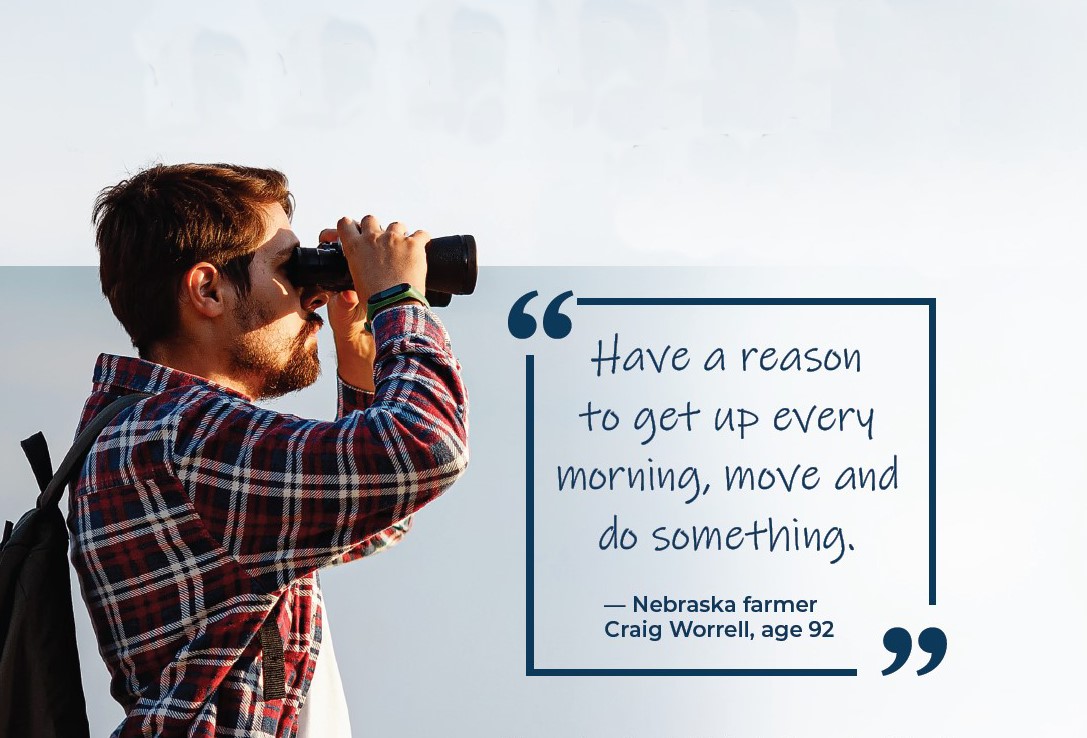
5 minute read
Purpose for a Full Life
"Have a reason to get up every morning, move and do something." — Nebraska farmer Craig Worrell, age 92
You may have heard of Nebraska farmer Craig Worrell. In November, at age 92, he completed his 70th harvest south of Cozad, Nebraska. He was blessed to have two sons helping in the fields, plus grandsons, his 2-year-old great-grandson, and his wife of 73 years, Betty.
Craig Worrell’s family farm still gives him plenty of reasons to get up each morning, even if now the younger generations do the hard work. Each of us can point to the lives of inspirational people. They frequently are remembered with a common phrase: “They lived a full life.” That is, they pursued visions bigger than themselves, they helped other people around them, they experienced a lot — setbacks, as well as successes — and, often, their lives were long and fruitful. Deep down, most of us hope to live the same way. Life is too brief to waste decades playing with trivial pursuits, binge-watching television, or fixating on our smartphones. At the end, it’s too late to regret what passionate purposes we might have pursued.
For 2024, consider four aspects of a full life: purpose, community, activity, and abundance. Purpose comes first because, to move forward, people need a map or a vision of where they’re going. The start of a year often is when we assess our direction and goals. As longtime Gleaner Life President Frank Dick said frequently:
Things don’t just happen. You make them happen.
Doing that in a purposeful way means first knowing what your purpose (or purposes) are.
Gary Sirak, an author and a Gleaner agent, defines purpose as “the things we do for others” in his book “How to Retire and Not Die.” Many of us find purpose in jobs, serving others while earning a livelihood. If we retire, we need to identify other goals. These might include volunteering or teaching. Gleaner Life assists members in building up their own communities. Ideally, the things we do for others overlap with our talents and our “passions,” the things we enjoy doing for ourselves.
You may already have a persistent vision, one or two things put on your heart year after year to help other people. It may seem scary but, if your purpose is larger than yourself, that’s to be expected. Faith is important, so your purpose should involve your beliefs. The Bible tells us God is purpose-driven as well (Jeremiah 32:19, Proverbs 19:21). Jesus is quoted in John 10:10b expressing love and purpose for his people (“I have come that they may have life, and have it to the full.”).
Sometimes we accept especially difficult challenges — not because we feel well-suited but because we know it’s the right thing to do. In such cases, purpose can influence commitment and even survival. “Life is never made unbearable by circumstances, but only by lack of meaning,” wrote Holocaust survivor and psychiatrist Viktor Frankl in his famous 1946 book “Man’s Search for Meaning.” Prisoners needed purpose to endure concentration camps. Frankl also found purpose essential for ordinary people to live meaningfully. “Without purpose and meaning, we’ll seek to distract ourselves in pleasure.”
Biblical prophets such as Jeremiah and apostles like Paul and John described how their purpose of sharing God’s message compelled them to a divine and paradoxical joy. Jeremiah was lowered by enemies into a muddy cistern, Paul was beaten repeatedly and thrown in prison, and John was exiled to a rocky island, yet each moved forward. God reassures us to trust Him even when setbacks lead to doubt: “‘For I know the plans I have for you,’ declares the Lord, ‘plans to prosper you and not to harm you, plans to give you a hope and a future.’” (Jeremiah 29:11)
More good news is that identifying a purpose larger than our own pleasure can also lead to healthier and longer lives. A number of studies have found that people who could express a clear goal in life not only lived longer but also stayed sharper. Researchers studying the world’s so-called “blue zones” where people routinely live to age 100 or older found similar results. Residents of Okinawa call it “ikigai” (“life purpose”). The term “plan de vida” means the same in Costa Rica.
“The purpose of life is not to be happy — but to matter, to be productive, to be useful, to have it make some difference that you lived at all.” — Writer Leo Rosten
Our lives may not seem momentous, but knowing we make a difference can be the key feature between a full life and an aimless, disappointing one. If you want to give back but aren’t sure where to start, Gleaner can help. Learn more about Gleaner’s volunteer opportunities at www.gleanerlife.org/givingback. May the year 2024 be purpose-driven and fully lived.
Did you nd the wheat stalk?
In this issue of Forum Magazine, the wheat stalk is hidden on Page 21.










